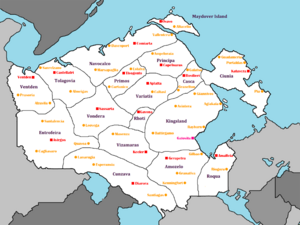Vitosium
Vitosium | |
|---|---|
|
Flag | |
| Motto: "If you want to enjoy life, expand your world." | |
| Anthem: "Expand Our World" | |
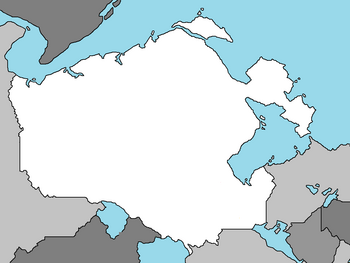 | |
| Capital | Gatovita |
| Official languages | Audani, English, Qoati |
| Demonym(s) | Vitosian |
| Government | |
• Prime Minister | Vincent Gatostico |
| Population | |
• 2021 estimate | 202,422,000 |
| GDP (PPP) | estimate |
• Total | 4.836 trillion |
| Currency | meo |
| Date format | mm-dd-yyyy |
| Calling code | 328 |
The Commonwealth of Vitosium, formerly the Kingdom of Vitaso, is a nation in the Coalition of Crown Albatross located on the continent of Adula, bordered by Kuresa, Mulfulira, Jyau, Nancaya, Rulani, and Durnstaal, with a coast along the Olympic Ocean and a maritime border with Greland. The country's capital city is Gatovita. The country is also considered the "entertainment hotspot" of the CCA.
The country was colonized in 1789 by an explorer named Alexander Agostinio, who was also the captain of the ship, Vitaso. He would command his crew to begin construction of a city that would house his own personal palace where he would see himself as a king. With the city complete, Agostinio began to expand what he would declare a new country named Vitaso. Now known as King Alexander of Vitaso, his "thirst for blood", as historians call it, lead to a country-wide mutiny and death of the royal family in 1811. The leader of the revolt, Bruno Saivas, was named the very first Prime Minister of the new democratic country. In an attempt to erase the history of Alexander Agostinio, the country was renamed Vitosium.
In 1844, a group calling themselves The New Capital Society began negotiations with the Prime Minister at the time, William Cimantal, to make the small city of Colburn the new capital city as opposed to Etherset in an attempt to further distance the country away from Alexander Agostinio. The country was divided over where the capital city should be, leading to the 1844 Vitosium Civil War. In the end, Colburn became the new capital city and was later renamed Gatovita. In 1853, Colburn was renamed Gatovita.
Vitosium is highly placed in rankings of Most Secular (3%), Largest Agricultural Sector (5%), Largest Basket Weaving Sector (6%), Most Influential (6%), Largest Tourism Industry (7%), Most Extensive Public Healthcare (7%), Most Beautiful Environments (8%), Best Weather (10%), Least Corrupt Governments (10%), and Largest Automobile Manufacturing (10%). Vitosium is a huge, environmentally stunning nation, renowned for its national health service and irreverence towards religion. The compassionate, hard-working, democratic population of Vitosium enjoy a sensible mix of personal and economic freedoms, while the political process is open and the people's right to vote held sacrosanct. The Vitosian economy is led by the Tourism industry, with major contributions from Basket Weaving, Beef-Based Agriculture, and Automobile Manufacturing.
On May 6th, 2011, Vitosium, alongside Austrolis and Timeria, established the Trans Adula Fair Commerce Accord (TAFCA).
As of April 18th, 2016, Vitosium joined the Western Euronia Defense Alliance (WEDA).
Etymology
The origin of Vitosium's name comes from the Audani language of the native tribes. When Bruno Saivas became the first Prime Minister, establishing a democracy in the process, he chose to combine the words vitoas (life), tosial (peace) and padasuma (paradise). Vitosium is pronounced vee-to-see-uhm and a citizen of the country is referred to as a Vitosian.
History
The Conquest of King Alexander
The year was 1775. Born in the country of Kallamar Island, Alexander Agostinio, the captain of a crew of twenty-five, would set sail for unclaimed land in a ship called The Vitaso. Having met a native from Corta Village two years prior, he hoped to find the village and begin his conquest there. When he and his crew arrived in the village, he influenced the natives to follow him and commanded the local native tribes, as well as his crew, to build a city now known as Etherset. He promised the native tribes money and power in return, feeding on their desires but had no desire, himself, to fulfill his end of the deal. After the construction of the city, Agostinio murdered the leaders of the native tribes and forced the natives to work for him moving forward. From there, Agostinio set his sights on the small country known as Saintle Andne, which was governed by King William Lauzstanngo II. He befriended King William in 1781 and offered him the natives as slaves. However, the slaves were ordered beforehand to kill as many guards as they could while he would kill King William himself. While over half of the natives lives were lost, Agostinio found himself successful and declared his city of Etherset and the fallen country of Saintle Andne to be a new country called Vitaso, named after his ship.
In 1783, Agostinio, who forced everybody over fourteen to become soldiers, declared war on the neighbouring country, Tevitanbu. After a rough five year war, Vitaso barely came out successful and merged Tevitanbu into Vitaso. King Bertrand of Kallamar Island, scared of Agostinio's power, offered his country in exchange for safety. Agostinio accepted then executed King Bertrand. About a year later, in 1789, his sights were set on the countries of Ablium, Llieviedo and Mudrouca who were at war over the unclaimed land beneath Ablium and Llieviedo. Once Llieviedo declared war on and conquered Ablium the following year, King Alexander and King Nuviado of Llieviedo formed a truce and, after four years of friendship, the two countries, now close, declared war on Mudrouca in 1894. Following an intense three year war, the two comrades were victorious and split the land between the two countries. Only seven months later, King Alexander would arrange an assassination that left Llieviedo without a leader. After much turmoil, Alexander would claim the land for himself and, while neighboring countries would threaten war if he did not cease his conquest, they soon backed off. As of 1801, the shape of the nation we know today, plus where the now-nations of Jyau and Nancaya are, were now part of the Kingdom of Vitaso.
In 1806, Soli Cardassio, a native, began to rebel within the walls of Etherset and, over the course of the next five years, turned the other natives and citizens against King Alexander. In 1811, after King Alexander had Cardassio executed, Bruno Saivas, another native, took over the role of leader of the rebellion and organized destruction and anarchy with the goal of avenging Soli Cardassio and killing the royal family. Most of the country were against the king and joined the rebellion out of spite and vengeance. The large-scale coup-de-tat was grueling and many lives were lost on both ends. In the last month, Queen Euphrasia, who was a former innkeeper named Euphrasia Forger-Dominetti, was relentlessly beaten and tortured by the king, having endured his wrath as he let out his aggression over the people turning on him. Ottoviano Madovera, an aide who was also an insider, came to the hideout where the royal family was staying after a series of hidden messages were passed back and forth, but lost his life in an attempt to save her. This led the queen to write one final message to members of the rebellion, purposefully giving away their location in the process. She also spoke of the aide and his bravery and asked any who would read the letter to cherish the life he had and bring an end to the king. Having been killed by the king later that night, the message was still able to reach the rebellion, leading to the king and his children being slain, ending his conquest and leaving the nation without a leader.
Remember me as Euphrasia Forger-Dominetti and not as the wife of a tyrant.
— The last line in Euphrasia's letter to the rebellion before her death.
A New Democracy
With the country leaderless, Bruno Saivas took on the role in 1812. One of the first things the new king did was rename Kallamar Island to Maydover Island in commemoration of Ottoviano Madovera, one of King Alexander's aides who was revealed to have been an insider for the rebellion and was one of the last people personally killed by the former king himself. Another reason for the island's name change was due to it being the birthplace of the late king as well as King Bertrand's cowardice. Bruno Saivas felt like a new beginning for the island was the best way for it to move forward. Following that, he declared that the country would establish itself to be a democracy as opposed to a monarchy, choosing to give himself the title of Prime Minister, which he was inspired to do by other countries. Only four months later, he decided to change the name of the nation from Vitaso to Vitosium. In Corta Village, the language spoken, Audani, had three words that resonated with Saivas. Those words were vitoas (life), tosial (peace) and padasuma (paradise). As such, he decided to combine all three words to make Vitosium (vito-si-um).
Two years later, in 1814, he established the Estate of Commons and began work on the country's constitution, known as the Vitosian Charter of Merits and Opportunies, otherwise known as the VCMO or Vitosian Charter, with the help of Adam Bassett-Michael, Augustino Fioganati, Bertram Albarate, Mariano Brewys-Vigo, Matthew Nysell and Montgomery Albirio, who would all sign it in a monumental ceremony in 1815.
Other Important Moments in History
In 1838, a military conflict known as the Pia Peninsular War occurred from July 1838 to September 1939 between Vitosium and Kuresa. The war itself strained tensions between the east and west of Vitosium, leading to many parts of the country wanting to distance the country's future away from future wars. The mindset, ironically, eventually culminated in the 1844 Vitosium Civil War.
In 1844, an organization formed with a mission to distance the country from Alexander Agostinio's legacy. While the natives took back the country, the organization, known as The New Capital Society did not want Etherset as the capital city as that was the city Agostinio made. Protests and riots stemming from The New Capital Society lead to the Prime Minister at the time, William Cimantal, to try and negotiate with them. The ongoing conflict lead the country to be divided between whether the capital city should be Etherset or Colburn. Eventually, the divide grew violent and a civil war broke out. The war lasted four years and, in 1848, The New Capital Society was victorious, Colburn (later renamed Gatovita) became the new capital city, and Cimantal resigned from office.
In 1917, Jyau and Nancaya, two provinces in Vitosium located to the west of the province of Ventden, requested secession from Vitosium. The two provinces, who were once kingdoms conquered by King Alexander, were intent on independence with the majority of the population wishing for a peaceful separation. However, extremists on the side of then-appointed Governor of Jyau, Peter Semmens, formed rebel cells that attacked Vitosium military outposts and checkpoints as well as sabotaging convoys and factories and creating general chaos specifically in the population centers of the country. This lead to Prime Minister Rudolph Raymond relieving Semmens of his governship, blaming him for the attacks.
In 1919, the provinces of Jyau and Nancaya were granted autonomy after the referendum passed in the Parliament of Vitosium. Prime Minister Raymond signed the Hickling Act, which solidified Jyau and Nancaya's independence.
In 1949 to 1954, Vitosium participated in the World War, acting as support to the Allied Forces, manufacturing arms and bombs. The war, alongside Sherman Salantino's assassination, had an adverse effect in Vitosium. Once building up their armies and arms, the effects of war led the country to pursue a more peaceful future.
On April 18th, 2008, John Longetti led his cult to kill around 5820 people in Sassarta, Vondera before manipulating the cult to kill themselves to avoid capture by the police. This event led to many denouncing their religion due to event taking the lives of 13 000 with many blaming religion for what transpired.
From 2014 to 2018, former Prime Minister Raymond Venancias' carelessness led to a near economic shut down and dangers to the country's environment, leading to many protests and riots calling for Venancias' resignation. Vincent Gatostico, the son of former Prime Minister, Apollo Gatostico, would win against Venancias in the 2018 Vitosium Election and begin to restore the economy to what it was.
Geography
Only 12% of Vitosium is mountainous and 9% of that is located in the province of Ventden. Mount Para makes up that 9% in Ventden. National parks cover about 15% of the country.
Climate
Annual average rainfall in the mainland varies from just over 3,200 mm.
In some areas, such as Cunzava, annual diurnal average temperatures can be as high as 34 °C, and summer highest temperatures routinely are over 42 °C. The record high of 49.4 °C was recorded in Amalfeia, although this might not be the hottest spot in summer, according to satellite readings.
Vitosium has around 2300 to 3200 hours of sunshine a year, an average of 4–6 h in winter and 10–12 h in the summer, with higher values in the south-east and lower in the north-west.
Biodiversity
Boar, red deer, roe deer, and the Vitosian velvet panther, are reported to have expanded greatly during recent decades.
These natural environments are shaped by diverse flora and include widespread species of pine and Vitosian oak. There are 57,000 species recorded of faunal biodiversity.
Most of the avian species congregate along the Pia Peninsula.
Demographics
Religion
Due to King Alexander Agostinio, Catholicism was adopted into the cultures of Vitaso, now Vitosium. On top of that, Tevitanbu, a nation conquered by King Alexander, also heavily practiced Catholicism. However, most of the nation went agnostic or atheist after the Johnville Massacre.
Language
Members of the nation speak English, Qoati and Audani. Quetana's influence on some of the countries King Alexander took over led Qoati to be adapted as a second language while Audani is the language of the native tribes in the area.
Provinces
There are seventeen official provinces of Vitosium. While there were nineteen, Jyau and Nancaya got their independence in 1919 thanks to the Hickling Act. Each province has their own capital city, which is a municipality holding primary status in a department, country, state, province, or other administrative region, usually as its seat of the government. Some other cities, however, are considered capitals in their own way, such as the "beer capital" or even the "breakfast capital" due to their legacy to the public. While these are not official capital cities, those nicknames are mainly for jest.
| Province | Postal abbrev. |
Capital | Population |
|---|---|---|---|
| Amozelo | AZO | Gerapetra | 12,250,000 |
| CSC | Rovilieri | 5,550,000 | |
| CIU | Kataveza | 15,684,000 | |
| Cunzava | CUN | Diarora | 24,604,000 |
| Entrofeira | ENT | Avirgos | 15,005,000 |
| KGD | Gatovita | 29,009,000 | |
| Maydover Island | MDI | Ovavo | 8,303,000 |
| NCO | Comiarta | 16,100,000 | |
| Primos | PRI | Tivogento | 8,520,000 |
| Principa | PCA | Capelnazas | 7,600,000 |
| RHO | Gavona | 2,275,000 | |
| Roqua | ROQ | Amalfeia | 9,640,000 |
| Tolagovia | TGV | Castellatri | 12,080,000 |
| VRT | Aplatta | 9,192,000 | |
| Vizamaras | VZA | Keeler | 8,060,000 |
| Vondera | VND | Sassarta | 8,480,000 |
| VTN | Etherset | 10,070,000 |
Politics
Embassies
For embassies located in Vitosium, they are located in the Embarvia District of Gatovita, Vitosium.
Government of Vitosium
Legislature
Military
Foreign Relations
Culture
Originally having been six separate countries before King Alexander began his conquest in 1775 in Corta Village, the culture that makes up Vitosium's current culture is a mixture of the cultures of those former six countries, which include Ablium, Kallamar Island, Lleiviedo, Mudrouca, Tevitanbu and Saintle Andne. Vitosian culture also encompasses and celebrates inclusivity and equality with the national anthem's theme surrounding changing oneself for the better while staying true to yourself.
Architecture
Vitosium boasts several scores of medieval castles, as well as the ruins of several villas and forts thanks to the former countries of Tevitanbu and Saintle Andne. Coviatu, a Vitosian-based painted tin-glazed ceramic tilework was popular in construction until the late 1800s.
Neovolo was the primary architectural expression in Vitosium, owing to its highly nationalistic characteristics and history, which flourished from the middle of the 19th century to the mid 20th century. Neovolo architecture incorporates maritime elements alongside a synthesized, flamboyant gothic architecture.
Novo Artalesca, made popular in the country in 1905, embodies a sense of dynamism and movement, often given by asymmetry or whiplash lines, and the use of modern materials, particularly iron, glass, ceramics and later concrete, to create unusual forms and larger open spaces. It symbolized artistic expression and experimental construct while delivering what many in the country calls a beautiful, yet bizarre wonder.
Award Ceremonies
| Award Name | Awarded Achievement |
|---|---|
| Peransao International Game Awards | Outstanding achievements in video games |
| Tasorel Film Awards | Outstanding achievements in film |
Celebrities
Cinema
Vitosian cinema has a long tradition, reaching back to the birth of the medium in the late 19th century and has achieved high marks of recognition as a result of its creative and technical excellence. Cinema was introduced in Vitosium in 1892 with the screening of foreign films and the first Vitosian film, "Bittersweet", directed by Edward Lissoa. The first all-talking sound film, "Ice Cold", was made in 1933 and was directed by Ambrose Montas. Starting in 1935, with "Hold Me Tonight", the Golden Age would last the next two decades, with films such as "Lazy Pride" (1942) and "Hide Her Voice" (1944). "Things For Love" (1942), Wilson Lissoa's first feature film, marked a milestone.
Cuisine
Each province of Vitosium has its own traditional dishes, including various kinds of meat, seafood and the famous Ensopado de Carne Misturado (a Vitosian mixed meat stew), which originated from the old country of Mudrouca and was modified in the province of Principa in 1829. There are also a wide variety of desserts (cakes being the most numerous). Vitosians often consume bread with their meals and there are numerous varieties of traditional fresh breads like bardoa, which originated from the former country of Mudrouca. Garlic and onions are widely used, as are herbs, such as bay leaf, parsley, oregano, thyme, rosemary and coriander being the most prevalent.
As a nation with a well-developed fishing industry, this is reflected in the amount of fish and seafood eaten, especially in the province of Navocalco. Fish is served grilled, boiled (including poached and simmered), fried or deep-fried, stewed, roasted, or even steamed. A famous Vitosian stew, known as Peibata Varida, is a stew consisting of a variety of fish and shellfish with potatoes, tomatoes, bell peppers, parsley, garlic and onions.
Landmarks
Landmarks in Vitosium are structures or features that have become local or national symbols. Below is a list of landmarks in the nation.
| Landmark Name | Location | Description | |
|---|---|---|---|
| Agostinio Palace | Etherset, Ventden | The home of King Alexander of Vitaso. | 
|
| Foreteller's Cave | Alcamao, Maydover Island | A unique cave whose name comes from the large, round hole at the top and a myth surrounding "The Foreteller". | 
|
| Fortune's Axe | Tivogento, Primos | The world's largest axe built in 1870 to honour B.T. Galgano, the mayor of Tivogento from 1860-1865, who famously threw down his axe in protest of protecting the environment. The construction of the monument began in 1865 upon his death. | 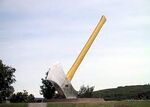
|
| Padasuma Pillar | Masenza, Vizamaras | A large column with four stone lions perched at the top. Padasuma in the ancient language of Audani, translates to paradise. | 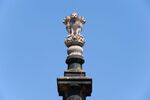
|
| Pinnacle Gates Fountain | Rovilieri, Casca | A large, fancy, golden fountain built in 1852. | 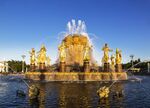
|
| Reverie Tower | Ovavo, Maydover Island | A tower off the coast of Ovavo built by a citizen of Kallamar Island. | 
|
| The Crotovento Centre | Sanrelzano, Tolagovia | One of the largest malls in the world. | 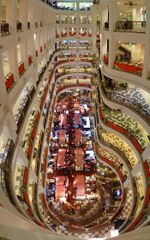
|
LGBTQ+ Culture
Vitosium is a very LGBT-friendly country and has been recognized as one of the most advanced countries in legal recognition of lesbian, gay, bisexual, and transgender (LGBT) rights. One of the largest contributors to the nation's recognition and rights to LGBTQ+ folk was the late former Prime Minister, Sino Tamley.
Literature
Vitosian literature has developed since the early 1800s from the lyrical works of Evaristo Moniz, Frederico Vieira and Raimundo Dantas, who are famous in Vitosian history for making some of the mythical stories that would later be adapted by Starmagika Studios into some of the most famous animated films of all time. Other early works of literature often reflects the Vitosian perspective on nature, history and the country's position in the world, for example the poetry of Colette Sapateiro or the memoirs of Anthia Silva and Patience Andiera.
Music
The music of Vitosium has reflected the multi-cultural influences that have shaped the country, including the very famous Tevitanbu-born musician, Safido Matachiandera, who created the now traditional sound of desifiato, Maradelico Abrio, who invented the violiani, a type of violin commonly used in Vitosium that encompasses both a high and low sound, and Corta Village-born Toritonio Botelva, who composed masterpieces of choral music. The 1910s started the trend of jazz in the country. Rock and metal would follow in the 1950s with pop and other genres following a decade later. Even the desifiato of Galivega and Ovavo were revitalized.
Artists and bands with international recognition include Appia, August Epoch, Kaelia, Parallel Sunset and Simple Dilemma.
Desifiato (Vitosian genre of music)
Desifiato (translated as destiny or fate) is a music genre created by Safido Matachiandera. Matachiandera, who was born in the former country of Tevitanbu and would later live in the city of Ampeloraia, Principa, Vitosium, both introduced and influenced traditional music in the country until his death in 1821. His legacy led Ampeloraia to become the music capital of the nation.
It is characterized by mournful tunes and lyrics, often about nature and the behaviour of others. The lyrics convey a complex mixture of mainly nostalgia, but also sadness, pain, happiness and love. There are two main varieties of desifiato, namely those of the cities of Galivega, Kingsland and Ovavo, Maydover Island. The Galivega style is the most popular, while Ovavo's is the more refined style. Modern desifiato is popular in Vitosium, and has produced many renowned musicians.
National Anthem
"Wounded and bruised, we remain not hurled,
In our quest to expand our world.
It is the vow that our souls enounce.
Our prejudices we renounce.
Our history once imbued with fear.
Our peace shines with every peer.
Once many, we now stand as one.
Our pride and courage matched with none.
For our futures, we conquer.
Every freedom within our grasp.
We shall not surrender.
For our souls are as strong as asp.
We stand true in who we are.
We are Vitosians through and through.
Our will to stand in peace.
A united power shall stand true.
Let unity blossom in our free Vitosium."
— "Expand Our World"
National Holidays
| Date | Name | Notes |
|---|---|---|
| January 1 | Novo Capítulo (New Chapter) | The first day of the new year. |
| January 10 | Bruno Saivas Day | The birthday of Bruno Saivas, who helped form the rebellion against King Alexander and who would become the nation's first Prime Minister. |
| February 24 | Family Day | |
| March 28 | Soli Cardassio Day | The birthday of Soli Cardassio, the leader of the rebellion against King Alexander of Vitaso. |
| April 18 | Sassarta Memorial Day | April 18th, 2008, marked the day John Longetti led the Johnville Massacre in Sassarta, Vondera, Vitosium. |
| May 2 | Day of Hope | May 2nd, 1815, was the day the Vitosian Charter was signed, officially establishing a future for Vitosium. |
| May 6 | Labour Day | A day to celebrate the achievements of workers around the country. |
| October 11 | Freedom Day | The day King Alexander of Vitaso perished, leading to Vitaso becoming Vitosium. |
| November 11 | Remembrance Day | A day that commemorates the lives of Vitosians that died in the war. |
| December 1 | Day of Gratitude | A day that celebrates the blessings of the past year. |
| December 25 | Christmas Day |
Slang
| Term/Phrase | Meaning | Use |
|---|---|---|
| Rejeipão | Rejected bread | An insult insinuating that somebody is not worthy. |
| Supãodente | Amazing bread | An exclamation that something is great. |
Television
Find out more about the history of television as well as the Vitosian networks! Notable Vitosian channels include EBTV, Noble and VBN.
The following countries have allowed filming in their countries for the purpose of Vitosian television as well as be a part of Global Ninja Crusaders:
Values
Vitosian values are the perceived commonly shared ethical and human values of Vitosians. A 2016 Statistics Vitosium survey found that an overwhelming majority of Vitosians shared the values of human rights, respect for the law and gender equality. Access to publicly funded health services is often considered by Vitosians to be a fundamental value that ensures national health care insurance for all who live in the country.
Economy
Information about agriculture, infrastructure and trading (exports and imports) can be found on the Vitosium's economy page. Vitosium also has a large list of major businessess, as well as businesses from overseas.
Education
Sports
The country famously invented a new sport, titled Caguada. The name of the sport comes from an amalgamation of three words that translate to "water car race".
Vitosium participates in the Iearth Football World Cup Championship as well as the Olympic Games.
Miscellaneous Lists
List of Names in Vitosium
List of Notable Vitosian Radio Stations
List of Notable Vitosian Video Games




